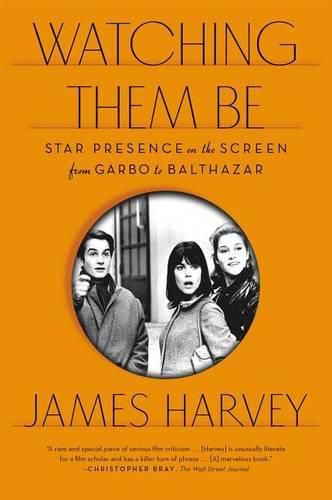Readings Newsletter
Become a Readings Member to make your shopping experience even easier.
Sign in or sign up for free!
You’re not far away from qualifying for FREE standard shipping within Australia
You’ve qualified for FREE standard shipping within Australia
The cart is loading…






This title is printed to order. This book may have been self-published. If so, we cannot guarantee the quality of the content. In the main most books will have gone through the editing process however some may not. We therefore suggest that you be aware of this before ordering this book. If in doubt check either the author or publisher’s details as we are unable to accept any returns unless they are faulty. Please contact us if you have any questions.
An intimate, thought-provoking exploration of the mysteries of star presence in cinema
‘One does not go to see them act, ’ wrote James Baldwin about the great iconic movie stars Wayne and Davis and Bogart, ‘one goes to watch them be’ … Of course. It seems obvious … Where else besides the movies do you get to see other persons so intimately, so pressingly, so largely even? Where else such intense and close, such sustained and searching looks as you have of these strangers on the screen, whoever they really are? In life you try not to stare; but at the movies that’s exactly what you get to do, two hours or more–safely, raptly, even blissfully.
It’s this sort of amplified, heightened, sometimes transcendent seeing that James Harvey explores in Watching Them Be. Marvelously vivid and perceptive, and impressively erudite, this is his take on how aura is communicated in movies. Beginning where Roland Barthes left off with the face of Greta Garbo and ending with Robert Bresson’s Au hasard Balthazar, Harvey moves nimbly and expertly through film history, celebrating actors and directors who have particularly conveyed a feeling of transcendence.
From Marlene Dietrich to John Wayne to Robert De Niro, from Nashville to Jackie Brown to Masculine Feminine and the implicitly or explicitly religious films of Roberto Rossellini and Carl Theodor Dreyer, this is one man’s personal, deeply felt account of the films that have changed his life. They will also, Harvey suggests, change yours.
$9.00 standard shipping within Australia
FREE standard shipping within Australia for orders over $100.00
Express & International shipping calculated at checkout
This title is printed to order. This book may have been self-published. If so, we cannot guarantee the quality of the content. In the main most books will have gone through the editing process however some may not. We therefore suggest that you be aware of this before ordering this book. If in doubt check either the author or publisher’s details as we are unable to accept any returns unless they are faulty. Please contact us if you have any questions.
An intimate, thought-provoking exploration of the mysteries of star presence in cinema
‘One does not go to see them act, ’ wrote James Baldwin about the great iconic movie stars Wayne and Davis and Bogart, ‘one goes to watch them be’ … Of course. It seems obvious … Where else besides the movies do you get to see other persons so intimately, so pressingly, so largely even? Where else such intense and close, such sustained and searching looks as you have of these strangers on the screen, whoever they really are? In life you try not to stare; but at the movies that’s exactly what you get to do, two hours or more–safely, raptly, even blissfully.
It’s this sort of amplified, heightened, sometimes transcendent seeing that James Harvey explores in Watching Them Be. Marvelously vivid and perceptive, and impressively erudite, this is his take on how aura is communicated in movies. Beginning where Roland Barthes left off with the face of Greta Garbo and ending with Robert Bresson’s Au hasard Balthazar, Harvey moves nimbly and expertly through film history, celebrating actors and directors who have particularly conveyed a feeling of transcendence.
From Marlene Dietrich to John Wayne to Robert De Niro, from Nashville to Jackie Brown to Masculine Feminine and the implicitly or explicitly religious films of Roberto Rossellini and Carl Theodor Dreyer, this is one man’s personal, deeply felt account of the films that have changed his life. They will also, Harvey suggests, change yours.